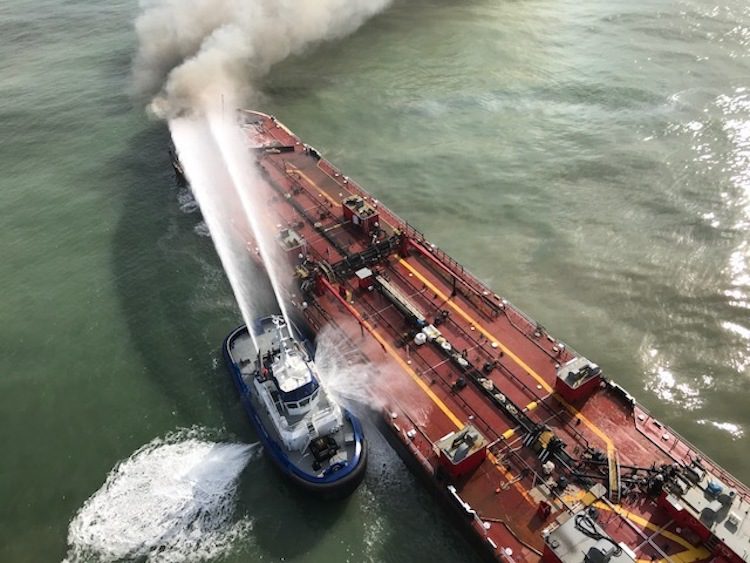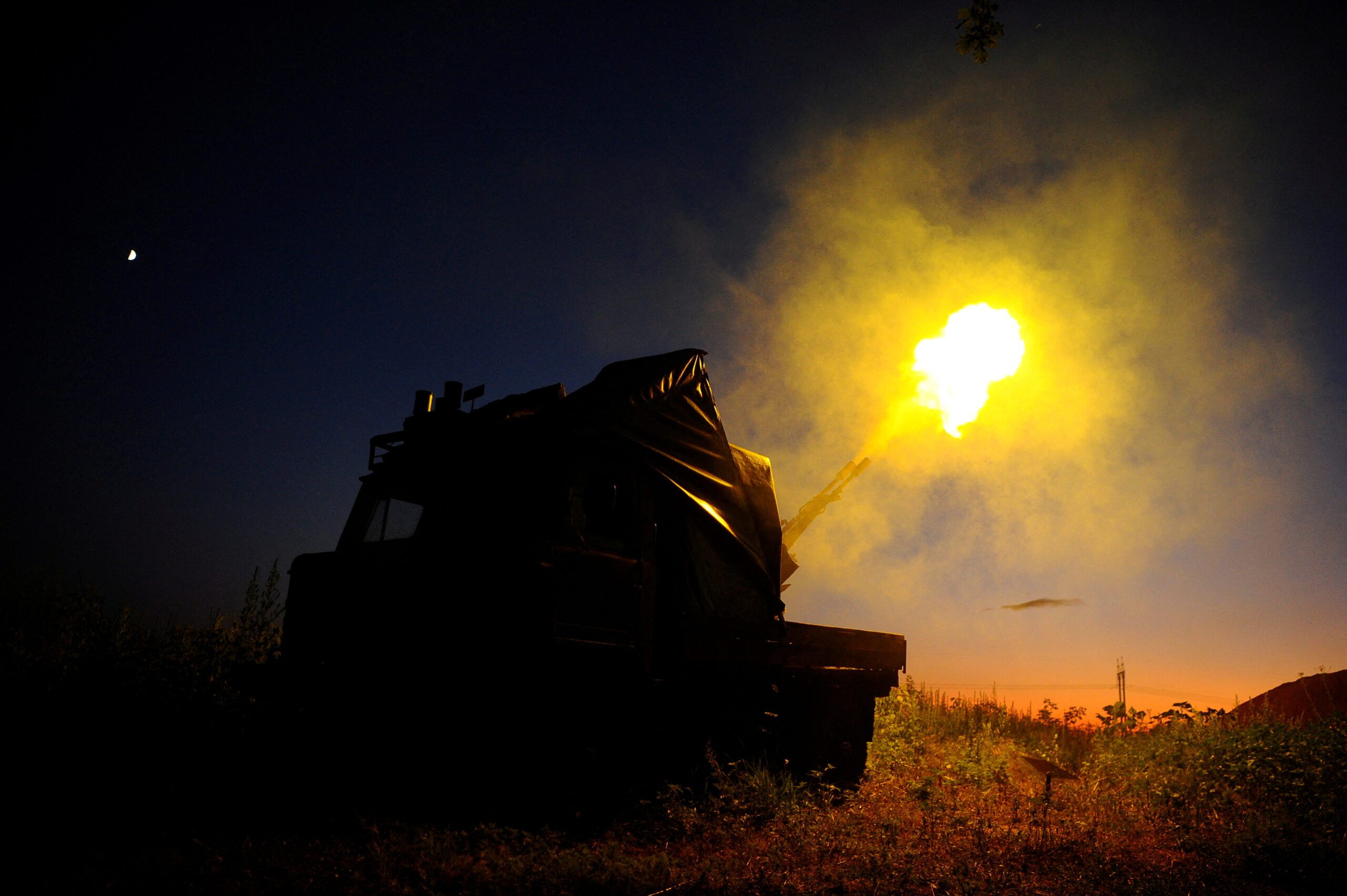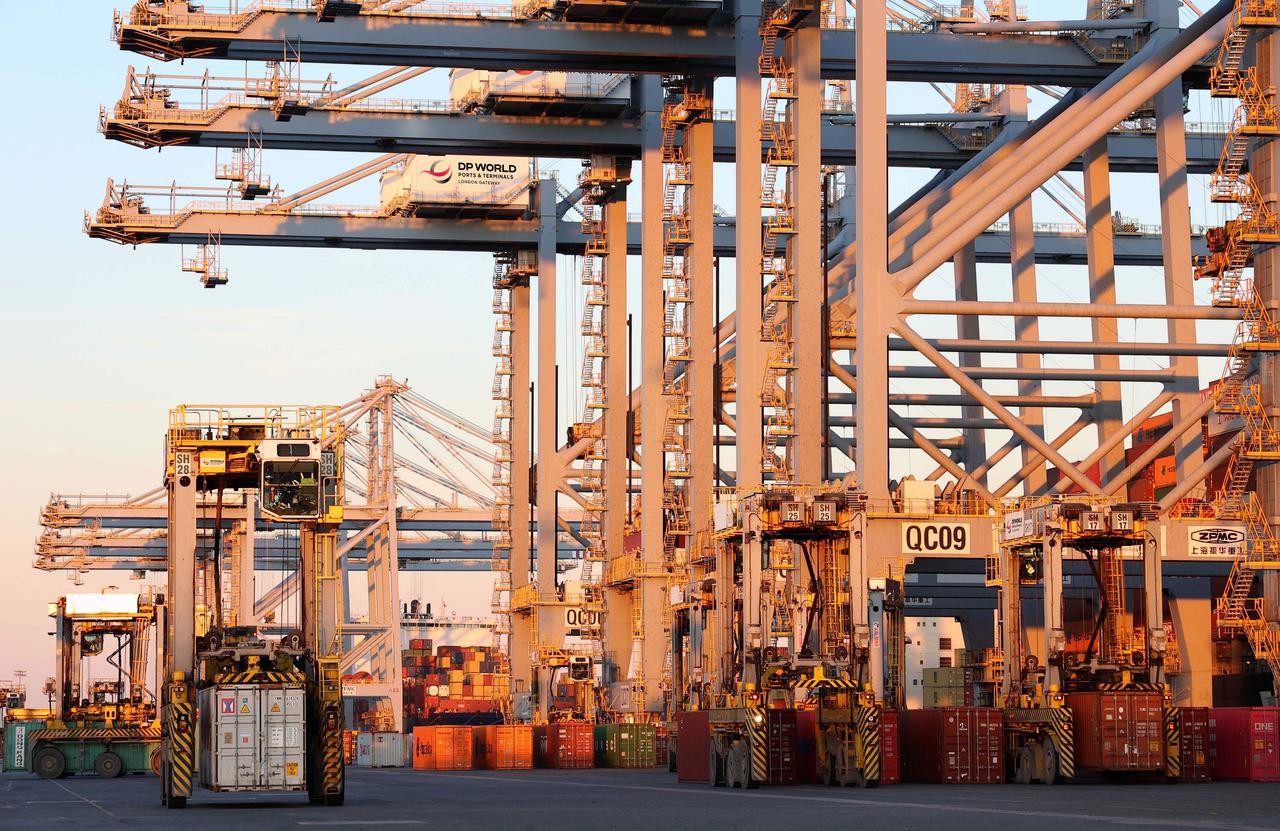A Corpus Christi Fire Department vessel extinguishes a fire onboard a barge approximately three miles from the Port Aransas, Texas, jetties Oct. 20, 2017. U.S. Coast Guard photo.
Editor’s Note: This is the first in a series of articles covering the U.S. Coast Guard’s public hearing on the explosion and fire aboard the Bouchard No. 255 tank barge that claimed the lives of two people off the coast of Port Aransas, Texas on October 20, 2017.
By Barbara Liston (Clearview Post) – A former seaman for the Bouchard Transportation Co. described watching low blue flames encircling the two deckhands on a loaded oil barge at Port Aransas, Texas, in 2017 moments before an explosion killed both crewmen.
Zachariah Jackson, 28, of Salt Lake City, and Du’jour Vanterpool, 26, of Houston, were thrown into the Gulf of Mexico by the force of the blast. Only Vanterpool’s body has been recovered.
Lonnie Roberts, first mate on the tugboat Buster Bouchard which was preparing to tow the barge to a refinery in Corpus Christi, testified at a U.S. Coast Guard hearing in Houston that he and Jackson were trying to raise the anchor on the vessels which were hitched together. Roberts said he was talking to Jackson by radio and trying to resolve an issue with the anchor chain when the blue flames caught his eye.
“That’s what I saw, was the blue flames that were kind of taking over that area where the guys were at… I didn’t understand it. I didn’t even get a chance to ask Zach. I was just caught up looking. He didn’t say anything,” Roberts recalled.
Roberts said he doesn’t know how long gas had been accumulating on the deck of the barge, but the fire looked like the initial flame that moves around a gas grill right after ignition.
“I have time to think to myself, what am I looking at – I’m trying to process it – and then the barge exploded,” he said.
The Coast Guard and National Transportation Safety Board are trying to determine the cause of the accident to try to prevent a recurrence.
Two more sizable blasts followed quickly and “at that point I was hearing blasts every second,” Roberts said.
According to the Coast Guard fact sheet, the 448-foot-long barge, known as Bouchard Barge No. 255, was loaded with 140,000 barrels of crude oil.
Roberts’ testimony took up most of Monday, the hearing’s opening day. He told the board that he is not currently employed.
Coast Guard and NTSB investigators questioned Roberts about the culture of safety on Bouchard vessels.
Roberts testified that the explosion occurred during a routine operation. Roberts said he had been on the tugboat for five days before the accident. When he arrived for his shift, he recalled being told about a fuel leak in the steering compartment of the tugboat that was being monitored. He said he understood repairs were to be made on arrival in Corpus Christi and that the problem had been reported to the Bouchard office.
Roberts said he considered the leak a hazardous condition.
Roberts said seamen know they all have what is called “stop work authority” if they believe a dangerous condition exists. But Roberts said he had never invoked the authority and that the seamen generally avoided documenting what he called “near-miss” accidents.
“We tried not to fill out paperwork for near misses because, at least on our vessel, there was a concern that guys would get fired for a near miss if you wrote a near miss or something someone did like that instead of learning from it. It was something that was pushed under the rug,” Roberts testified, adding, “It was just part of the culture of the company.”
Roberts said rumors throughout the fleet about firings contributed to the silence, although he said he had no first-hand knowledge of anyone being fired as a result of a near-miss report.
Asked whether the company showed the highest level of commitment to safety management systems, Roberts said, “In my opinion, I don’t believe that they did, no.”
Roberts said he made a walk-around of the barge but was not familiar enough with the vessel to know whether it was in good repair. But he recalled Jackson mentioning some problems to him.
“He made some mention he was finding some things that in his opinion needed to be fixed,” Roberts testified.
Timothy Lerette, the tugboat’s assistant engineer, testified on Tuesday that he had talked to Jackson about the barge’s problems. Lerette said Jackson told him that he had requested repairs be made on the barge and that “Donohue” told him that “he’s going to regret it.”
Kevin Donohue, Bouchard vice president for safety and vetting, is scheduled to testify on Thursday.
Jackson’s parents have filed a wrongful death claim against the company, alleging that the 38-year-old barge and tug were “improperly maintained, dangerous, unseaworthy, and otherwise unfit for the purpose they were being used.” The lawsuit seeks more than $1 million in damages, according to the complaint filed by Kurt Arnold of Arnold & Itkin in Houston.
Bouchard of Melville, New York, calls itself “the nation’s largest independently-owned ocean-going petroleum barge company.” On its website, the company states that its fleet consists of 26 barges and 25 tugs.
The company’s LinkedIn page describes it as a family-owned concern of five generations of the Bouchard family.
Bouchard was responsible for a barge accident in 2003 near Cape Cod, Massachusetts, which is considered the fifth worst of the top ten maritime accidents in U.S. history, according to Workboat.com, a news site for professional mariners about the workboat industry.
A tugboat towing the unmanned 28-year-old Bouchard Barge No. 120 carrying 4.1 million gallons of No. 6 fuel oil passed on the wrong side of navigational markers at the entrance to Buzzards Bay. The barge hit a shoal, ripping open a hole and spilling 98,000 gallons of fuel oil which fouled more than 90 miles of shoreline over the following two weeks.
The disaster lead to the Massachusetts Oil Spill Prevention Act of 2004, described as one of the strongest safety measures in the nation, which required improved staffing and monitoring of oil shipments through Buzzards Bay and the Cape Cod Canal, according to Workboat.com.
The company pleaded guilty in federal court in 2004 to criminal negligence and paid a $10 million fine, in addition to millions of dollars the company was expected to pay to help with the cleanup, according to the South Coast Today newspaper in New Bedford.
As the Cape Cod community dealt with the spill, the Cape Cod Times newspaper researched a history of other spills and accidents in the Northeast by Bouchard-owned vessels.
The Times cited among other incidents two cases of Bouchard barges running aground and spilling a total of 125,000 gallons of oil, another barge which sank in the Cape Cod Canal and a barge explosion on Staten Island which killed two.
Editor’s Note: This article is part of a series focussing on the U.S. Coast Guard’s public hearing on the explosion and fire aboard the Bouchard No. 255 tank barge that claimed the lives of two people off the coast of Port Aransas, Texas on October 20, 2017. The full series of articles on the hearing can be found here or at the links below:
Links to more articles in the series:
(You are here) Part 1: ‘I Was Hearing Blasts Every Second
Part 2: ‘He Slipped Out of His Life Jacket and Sank to the Bottom’
Part 3: Conflicting Testimony and Disputed Phone Calls
Part 4: Former Bouchard VP ‘Shocked’ at Condition of Barge 255
Part 5: ‘No one could say they didn’t know about the problems’
Part 6: Final Day – ‘Sitting On a Big Powder Keg’

 Join The Club
Join The Club











